
Skiing enthusiasts gather in Altay Prefecture, northwest China's Xinjiang Uygur Autonomous Region, Jan. 12, 2023.
Altay Prefecture is known for its long winter season that can last up to eight months a year. It is attracting skiers worldwide with its vast area of natural powder snow.
The region has aspired to boost winter tourism in recent years, alluring visitors with skiing, ice fishing and other winter activities. It welcomed some 1.02 million tourists between December 2022 and Jan. 11, 2023. (Xinhua/Hu Huhu)
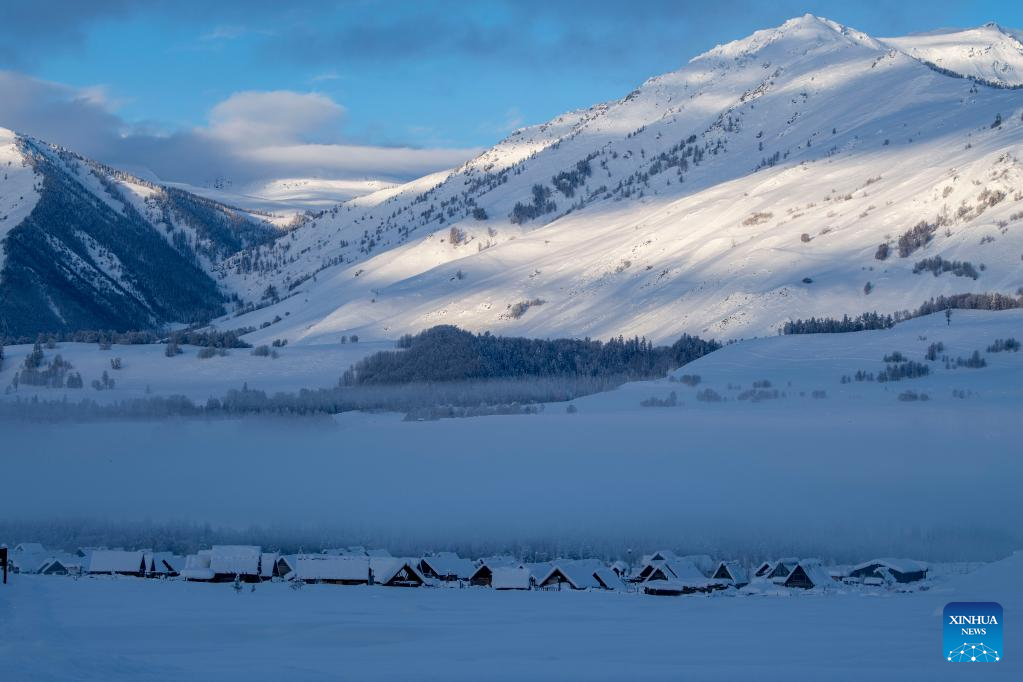
This photo taken on Jan. 8, 2023 shows the snow resort of Hemu in Altay Prefecture, northwest China's Xinjiang Uygur Autonomous Region.
Altay Prefecture is known for its long winter season that can last up to eight months a year. It is attracting skiers worldwide with its vast area of natural powder snow.
The region has aspired to boost winter tourism in recent years, alluring visitors with skiing, ice fishing and other winter activities. It welcomed some 1.02 million tourists between December 2022 and Jan. 11, 2023. (Xinhua/Hu Huhu)
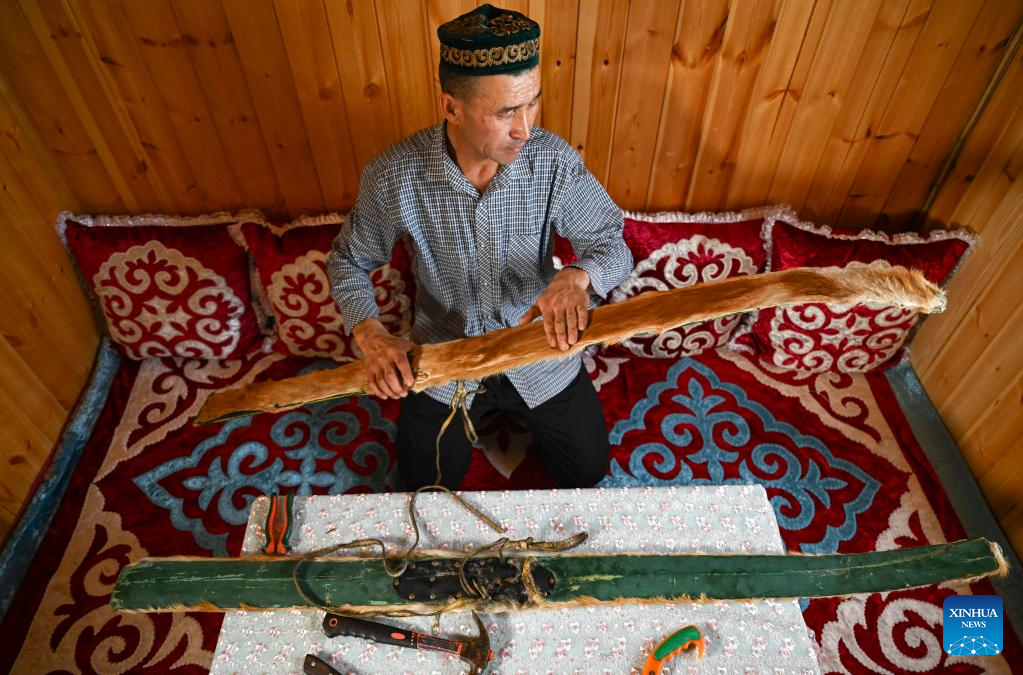
A herdsman shows a pair of fur-covered skis at home in Altay Prefecture, northwest China's Xinjiang Uygur Autonomous Region, Dec. 22, 2022.
Altay Prefecture is known for its long winter season that can last up to eight months a year. It is attracting skiers worldwide with its vast area of natural powder snow.
The region has aspired to boost winter tourism in recent years, alluring visitors with skiing, ice fishing and other winter activities. It welcomed some 1.02 million tourists between December 2022 and Jan. 11, 2023. (Xinhua/Hu Huhu)

A homestay owner promotes the snow resort of Hemu via a live show in Altay Prefecture, northwest China's Xinjiang Uygur Autonomous Region, Jan. 7, 2023.
Altay Prefecture is known for its long winter season that can last up to eight months a year. It is attracting skiers worldwide with its vast area of natural powder snow.
The region has aspired to boost winter tourism in recent years, alluring visitors with skiing, ice fishing and other winter activities. It welcomed some 1.02 million tourists between December 2022 and Jan. 11, 2023. (Xinhua/Hu Huhu)
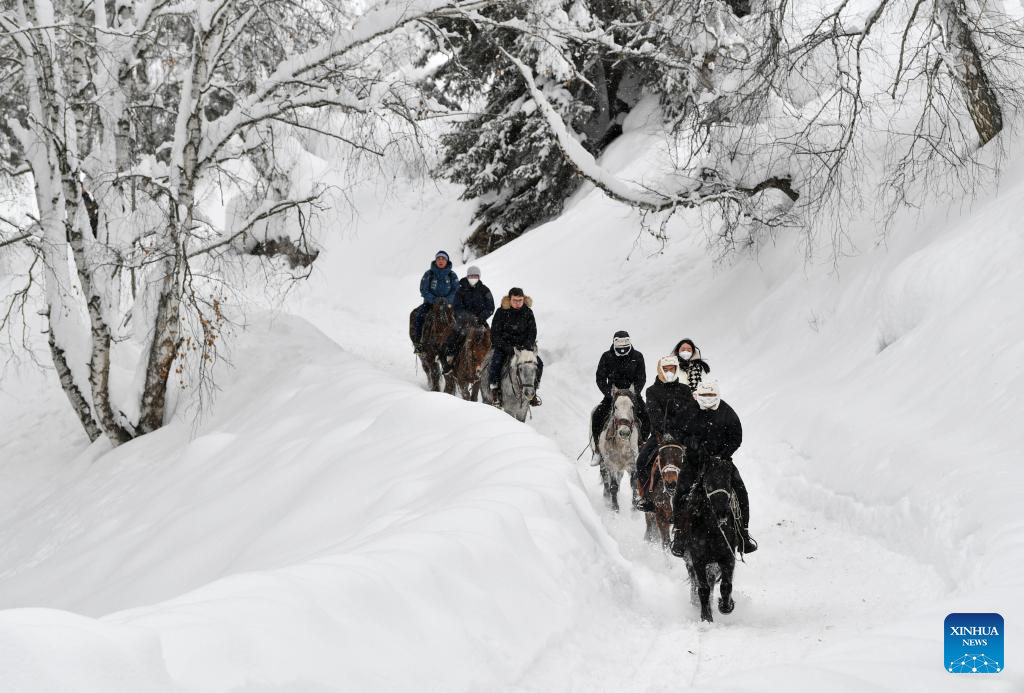
Tourists ride horses in Altay Prefecture, northwest China's Xinjiang Uygur Autonomous Region, Jan. 7, 2023.
Altay Prefecture is known for its long winter season that can last up to eight months a year. It is attracting skiers worldwide with its vast area of natural powder snow.
The region has aspired to boost winter tourism in recent years, alluring visitors with skiing, ice fishing and other winter activities. It welcomed some 1.02 million tourists between December 2022 and Jan. 11, 2023. (Xinhua/Hu Huhu)
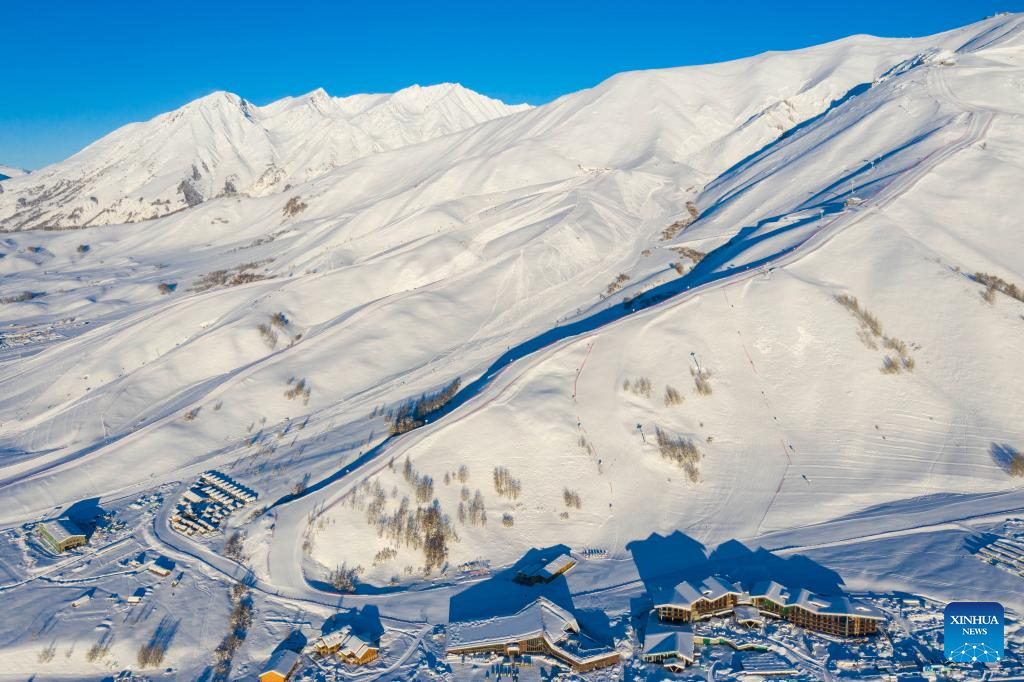
This aerial photo taken on Jan. 12, 2023 shows the Jikepulin International Ski Resort in Altay Prefecture, northwest China's Xinjiang Uygur Autonomous Region.
Altay Prefecture is known for its long winter season that can last up to eight months a year. It is attracting skiers worldwide with its vast area of natural powder snow.
The region has aspired to boost winter tourism in recent years, alluring visitors with skiing, ice fishing and other winter activities. It welcomed some 1.02 million tourists between December 2022 and Jan. 11, 2023. (Xinhua/Hu Huhu)
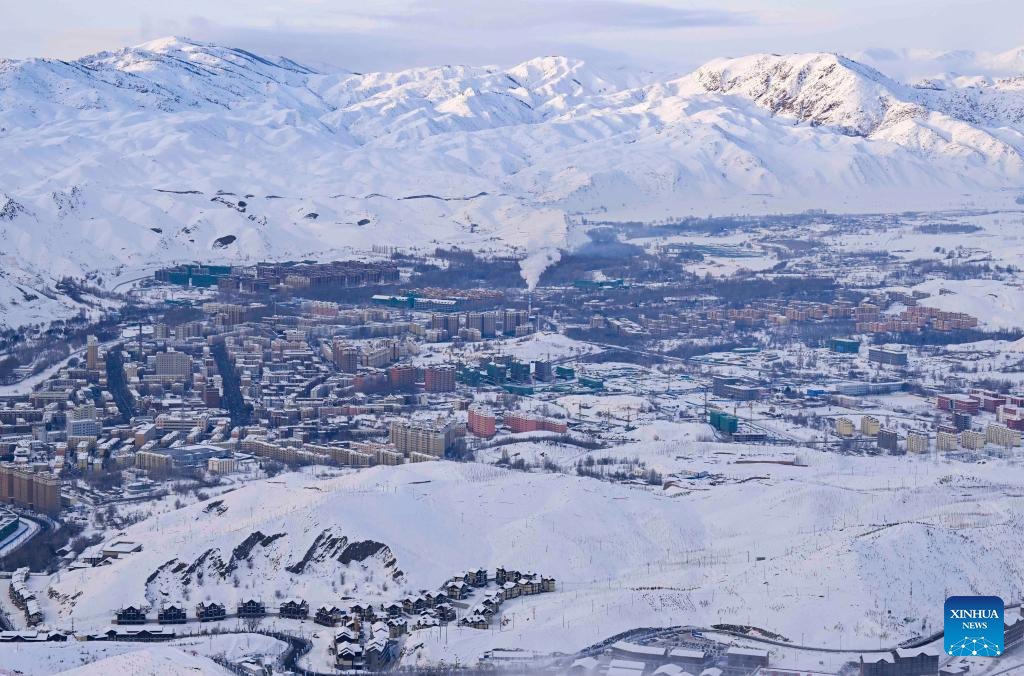
This aerial photo taken on Dec. 30, 2022 shows a view of Altay City in northwest China's Xinjiang Uygur Autonomous Region.
Altay Prefecture is known for its long winter season that can last up to eight months a year. It is attracting skiers worldwide with its vast area of natural powder snow.
The region has aspired to boost winter tourism in recent years, alluring visitors with skiing, ice fishing and other winter activities. It welcomed some 1.02 million tourists between December 2022 and Jan. 11, 2023. (Xinhua/Hu Huhu)

Tourists pose for photos at a ski resort in Altay City, northwest China's Xinjiang Uygur Autonomous Region, Dec. 30, 2022.
Altay Prefecture is known for its long winter season that can last up to eight months a year. It is attracting skiers worldwide with its vast area of natural powder snow.
The region has aspired to boost winter tourism in recent years, alluring visitors with skiing, ice fishing and other winter activities. It welcomed some 1.02 million tourists between December 2022 and Jan. 11, 2023. (Xinhua/Hu Huhu)
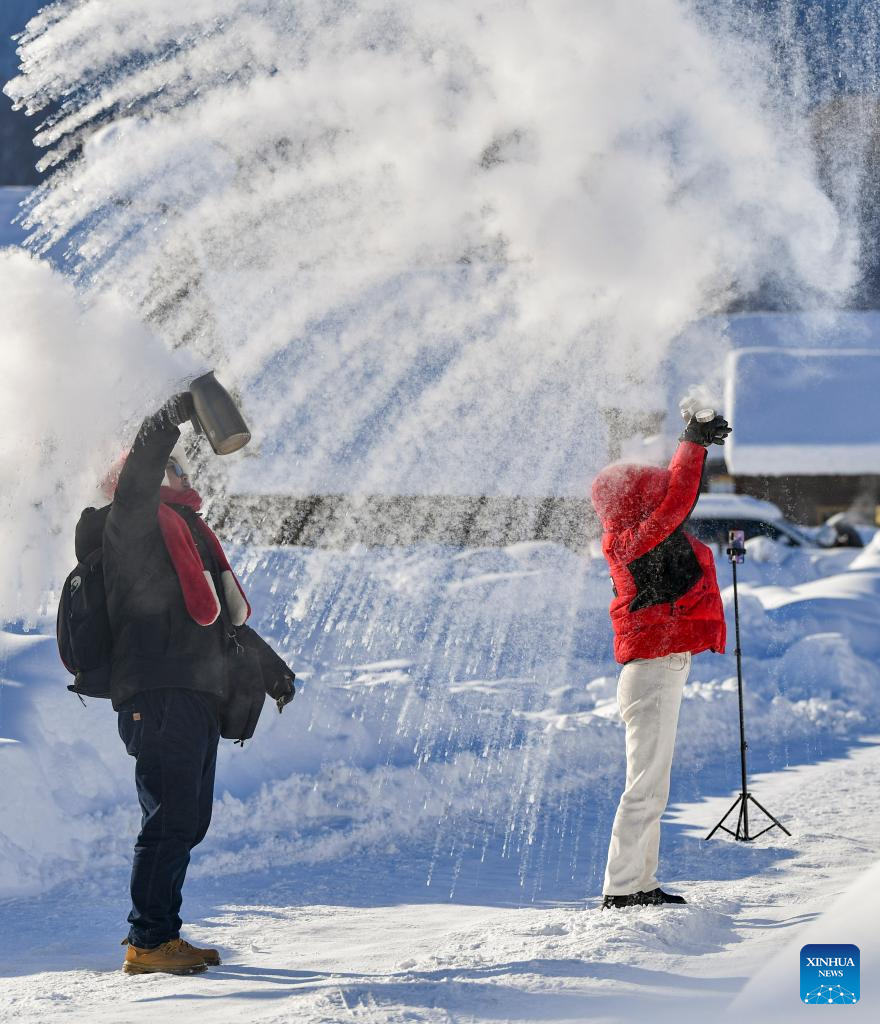
Tourists livestream a game in which they splash water into ice amid extreme cold weather in Altay Prefecture, northwest China's Xinjiang Uygur Autonomous Region, Jan. 12, 2023.
Altay Prefecture is known for its long winter season that can last up to eight months a year. It is attracting skiers worldwide with its vast area of natural powder snow.
The region has aspired to boost winter tourism in recent years, alluring visitors with skiing, ice fishing and other winter activities. It welcomed some 1.02 million tourists between December 2022 and Jan. 11, 2023. (Xinhua/Hu Huhu)
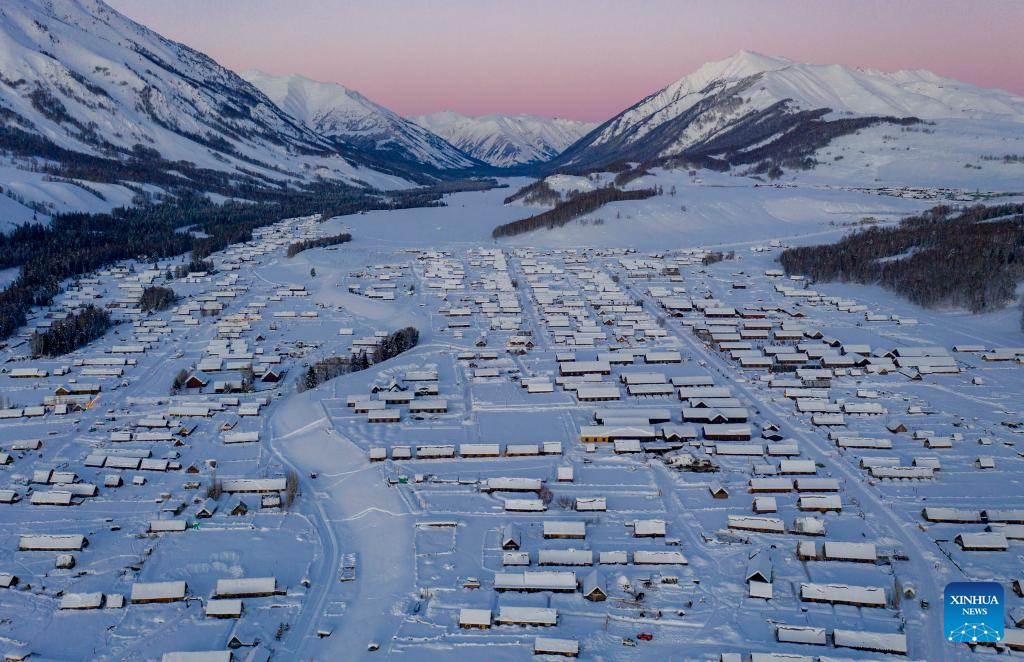
This aerial photo taken on Jan. 12, 2023 shows the snow resort of Hemu in Altay Prefecture, northwest China's Xinjiang Uygur Autonomous Region.
Altay Prefecture is known for its long winter season that can last up to eight months a year. It is attracting skiers worldwide with its vast area of natural powder snow.
The region has aspired to boost winter tourism in recent years, alluring visitors with skiing, ice fishing and other winter activities. It welcomed some 1.02 million tourists between December 2022 and Jan. 11, 2023. (Xinhua/Hu Huhu)

Staff members unload skiing equipment from a passenger plane which has arrived from the southern Chinese city of Guangzhou at an airport in Altay City, northwest China's Xinjiang Uygur Autonomous Region, Dec. 30, 2022.
Altay Prefecture is known for its long winter season that can last up to eight months a year. It is attracting skiers worldwide with its vast area of natural powder snow.
The region has aspired to boost winter tourism in recent years, alluring visitors with skiing, ice fishing and other winter activities. It welcomed some 1.02 million tourists between December 2022 and Jan. 11, 2023. (Xinhua/Hu Huhu)

A staff member puts skiing equipment in place at a ski resort in Altay City, northwest China's Xinjiang Uygur Autonomous Region, Jan. 4, 2023.
Altay Prefecture is known for its long winter season that can last up to eight months a year. It is attracting skiers worldwide with its vast area of natural powder snow.
The region has aspired to boost winter tourism in recent years, alluring visitors with skiing, ice fishing and other winter activities. It welcomed some 1.02 million tourists between December 2022 and Jan. 11, 2023. (Xinhua/Hu Huhu)
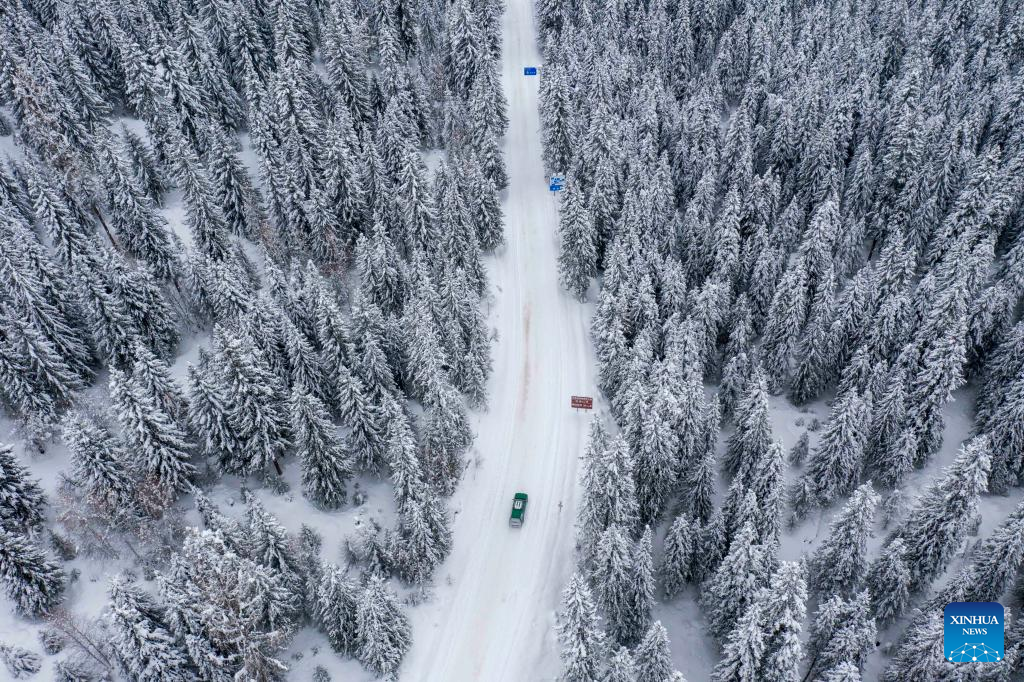
This aerial photo taken on Jan. 8, 2023 shows a vehicle running in the Kanas scenic area in Altay Prefecture, northwest China's Xinjiang Uygur Autonomous Region.
Altay Prefecture is known for its long winter season that can last up to eight months a year. It is attracting skiers worldwide with its vast area of natural powder snow.
The region has aspired to boost winter tourism in recent years, alluring visitors with skiing, ice fishing and other winter activities. It welcomed some 1.02 million tourists between December 2022 and Jan. 11, 2023. (Xinhua/Hu Huhu)
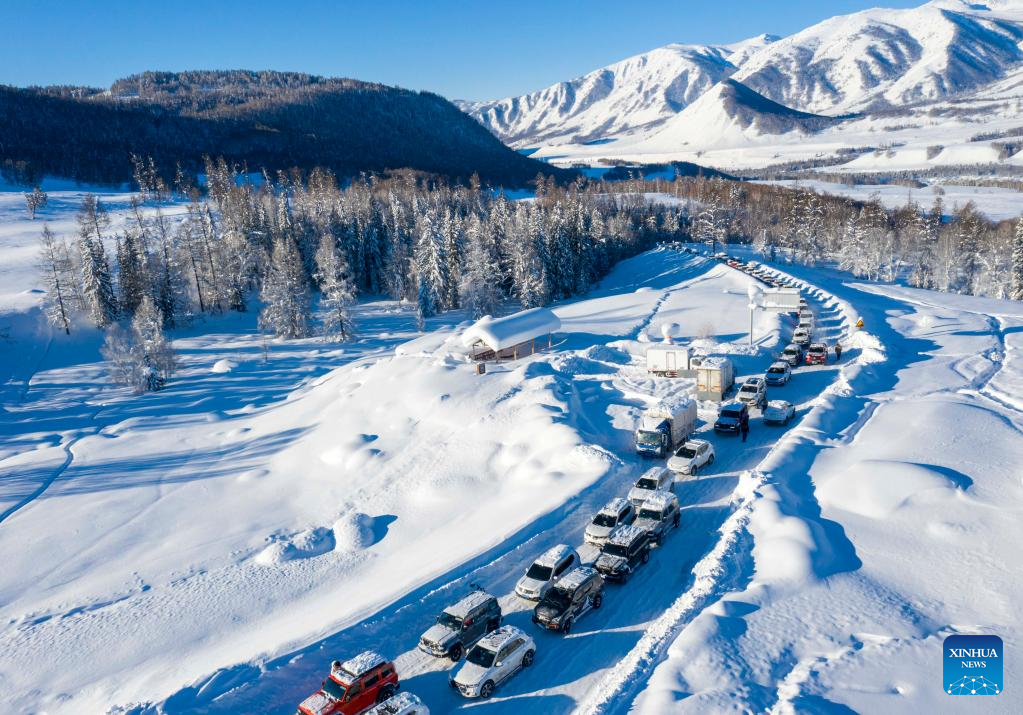
This aerial photo shows cars entering the snow resort of Hemu in Altay Prefecture, northwest China's Xinjiang Uygur Autonomous Region, Jan. 12, 2023.
Altay Prefecture is known for its long winter season that can last up to eight months a year. It is attracting skiers worldwide with its vast area of natural powder snow.
The region has aspired to boost winter tourism in recent years, alluring visitors with skiing, ice fishing and other winter activities. It welcomed some 1.02 million tourists between December 2022 and Jan. 11, 2023. (Xinhua/Hu Huhu)
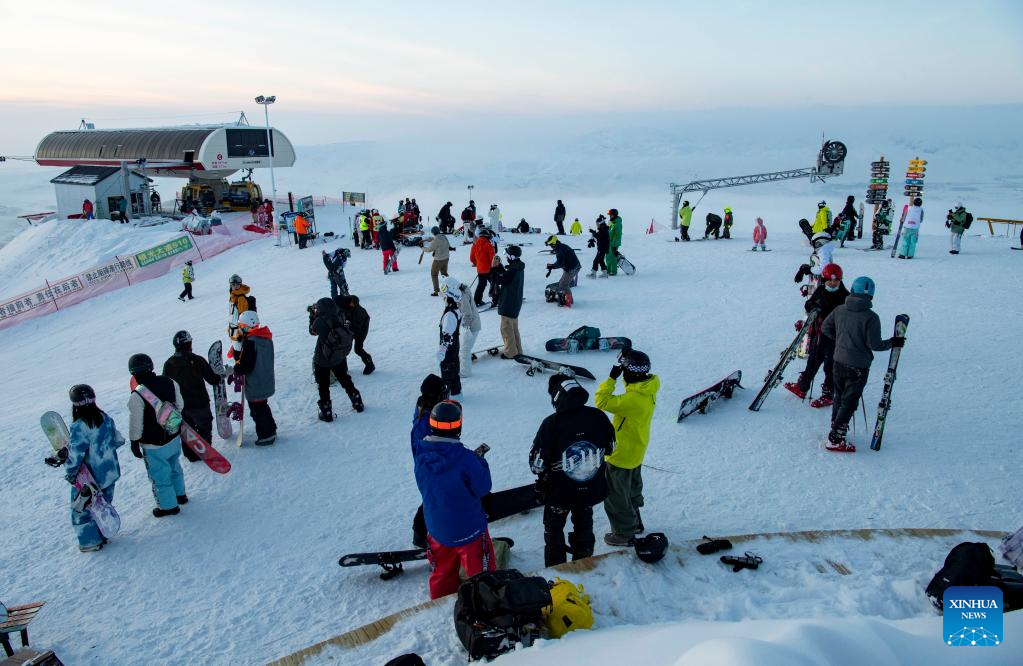
People have fun at a ski resort in Altay City, northwest China's Xinjiang Uygur Autonomous Region, Jan. 2, 2023.
Altay Prefecture is known for its long winter season that can last up to eight months a year. It is attracting skiers worldwide with its vast area of natural powder snow.
The region has aspired to boost winter tourism in recent years, alluring visitors with skiing, ice fishing and other winter activities. It welcomed some 1.02 million tourists between December 2022 and Jan. 11, 2023. (Xinhua/Hu Huhu)



